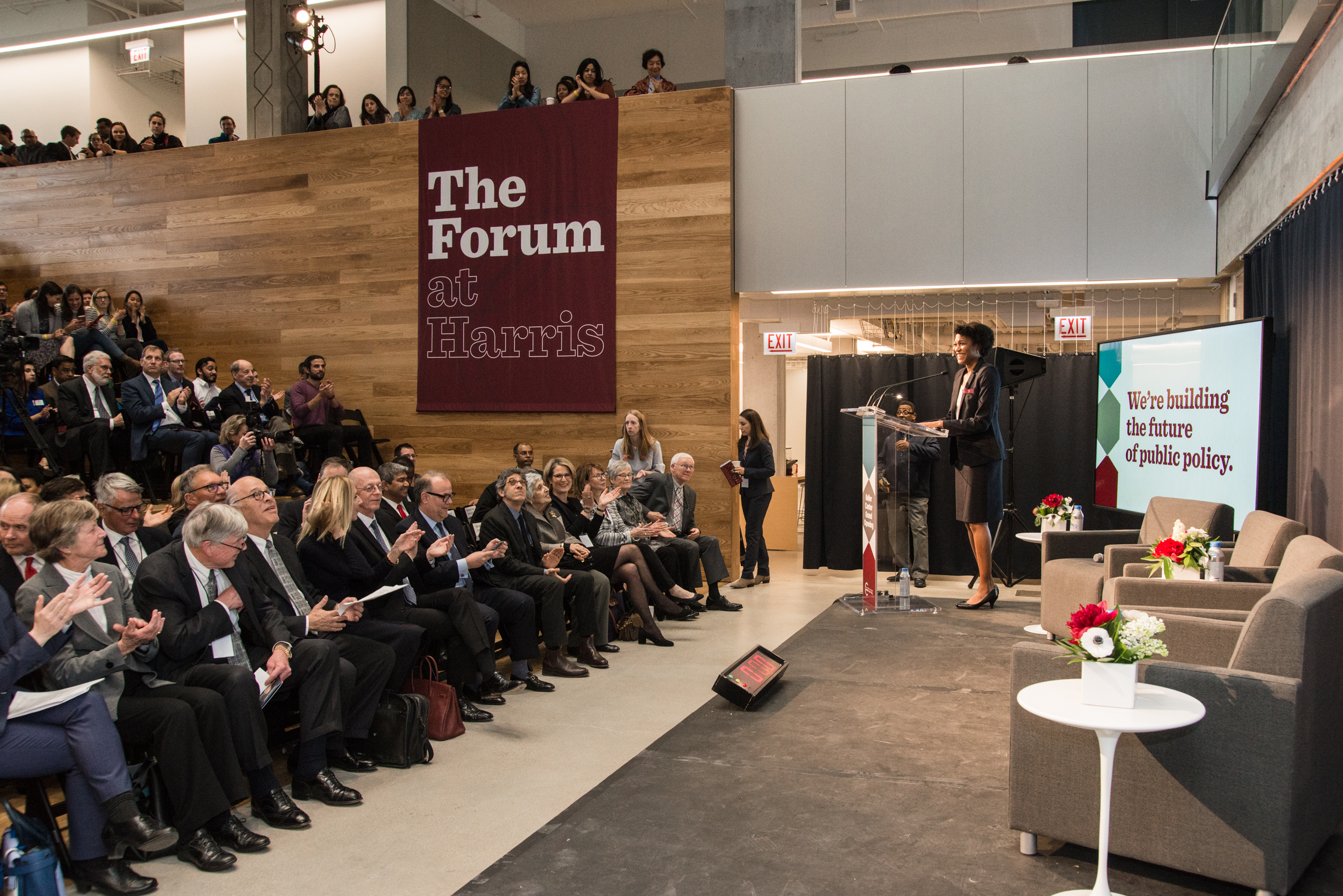Harris
Public
Policy
Specialization in Global Conflict Studies
While past generations witnessed world wars and other great power struggles, global conflict has evolved to include violent extremism, large-scale displacement, and failed nations. Future leaders must also adapt their concepts and empirical approaches in order to understand the new nature of conflict when proposing solutions for the future.
By focusing on comparative development, political economy, and applied methodology, The Pearson Institute Global Conflict Studies Specialization is designed to prepare students for careers in government, non-governmental organizations, international organizations, or multinational corporations.
Students who complete this specialization will be able to:
- Develop the ability to discern what makes empirical evidence compelling related to conflict study
- Assess key arguments advanced in the arena of conflict and consider, through an evidence-based lens, the relationship of conflict to factors such as economic opportunity, natural resources, foreign aid, military technology, ethnic divisions and identity, etc.
- Understand the intersection between state-level societal incentives and global governance structures
Harris specializations function as areas of specialization within the degree. Specializations assume knowledge of the 6-course Harris Core and build upon that foundation with coursework in specific policy areas or technical skills.
In addition, we encourage students pursuing the specialization to participate in events sponsored by The Pearson Institute for the Study and Resolution of Global Conflicts.
Application Process
The specialization is open to Harris Public Policy graduate students only. Please indicate your intent to pursue this specialization using the Harris Specialization Declaration Form.
For specialization registration questions, please reach out to harrisregistration@uchicago.edu.
Planning for the Specialization
For information on which quarter(s) each course will be offered see the Harris Courses page and filter by specialization.
Specialization Requirements
The specialization will be awarded to students who complete any three of the qualifying courses. Students must achieve at least a B- grade in each course. No specialization course may be taken on a pass/fail grading basis.
The following two courses are recommended as a fundamental sequence of the specialization:
- PPHA 35570: Conflict and Humanitarian Intervention: Blurring Humanitarian, Development, and Security Policy
- PPHA 38740: Conflict and Applied Data Science
Other qualifying specialization courses
- PPHA 32740 Order and Violence
- PPHA 32750 Hydropolitics: Water Policy and Conflict
- PPHA 33510 Nuclear Policy
- PPHA 33840 Managing Chaos: Competing Strategies in a Disordered World
- PPHA 60000 Policy Lab (Global Conflict and International Development sections only)
- INRE 43000 Core Seminar: International Order and Security
- PBPL 20115 / PPHA 47420 Women, Peace, and Security
- PLSC 40610 Seminar on International Security Affairs
- PLSC 48401 / PPHA 39830: Quantitative Security
- SSAD 46922: Structuring Refuge: U.S. Refugee Policy and Resettlement Practice
- SSAD 47812: Human Rights and Social Work: Opportunities for Policy and Practice
- Not offered in 24-25
- PPHA 38765 The Politics of Authoritarian Regimes
Specialization in International Policy and Development
The International Policy and Development (IPD) Specialization focuses on two broad kinds of questions:
1. How to achieve economic and political development? These courses focus on why some people and societies are poor, unequal, unstable, or unfree, and what circumstances and policies promote wealth, equality, stability, and freedoms.
2. How to design and implement public policy globally? The courses focus on public policy issues in an international setting across a range of subjects, including: education, health, children, criminal justice, public finance, labor markets, elections, and so forth.
The IPD specialization is designed to prepare students for careers in government, non-governmental organizations, international organizations, or multinational corporations.
Students who complete this specialization will be able to:
- Assess key arguments advanced historically and currently in the arena of development
- Understand whether and why an intervention is successful or not, whether an intervention is scalable and how to meaningfully measure outcomes
- Seek data-driven solutions to development issues across multiple sectors, including economy, education, governance, energy, security, gender, health, and the environment
The specialization’s curated list of electives is designed to allow students to explore multiple academic approaches to understanding development, including from economics, political science, statistics, and psychology. In addition, we encourage students pursuing the specialization to participate in events sponsored by The Pearson Institute for the Study and Resolution of Global Conflicts.
Harris specializations function as areas of specialization within the degree. specializations assume knowledge of the 6-course Harris Core and build upon that foundation with coursework in specific policy areas or technical skills.
Application Process
The specialization is open to Harris Public Policy graduate students only. Please indicate your intent to pursue this specialization using the Harris Specialization Declaration Form.
For specialization registration questions, please reach out to harrisregistration@uchicago.edu.
Planning for the Specialization
For information on which quarter(s) each course will be offered see the Harris Courses page and filter by specialization.
Specialization Requirements
The specialization requires completion of three specialization courses. Students must achieve at least a B- grade in each course. No specialization course may be taken on a pass/fail grading basis. The courses do not need to be taken in a particular order.
The specialization will be awarded to students who complete any three of the qualifying courses; however, the following two courses are recommended as a fundamental sequence of the specialization:
- PPHA 35550 Economic Development and Policy
- PPHA 35556 Power and "Development"
The following courses also fulfill the requirement for the International Development and Policy specialization:
- PPHA 32736 Economics, Politics and African Societies
- PPHA 32740 Order and Violence
- PPHA 34600 Program Evaluation (International Policy Focus)
- PPHA 35240 Education, Inequality, and Economic Development
- PPHA 35540 How to Change the World: Science of Policymaking in International Policy and Development
- PPHA 35560 Translating Evidence for Policy and Program Design
- PPHA 35565 Infrastructure and Development
- PPHA 35575 Behavioral Experiments in International Development: From Theory to Practice
- PPHA 35577 Big Data and Development
- PPHA 35578 Qualitative Methods for International Policy and Development
- PPHA 35588 Political Economy of China in the Global Era
- PPHA 37040 Economic Growth and Development
- PPHA 39930 International Climate Policy
- PPHA 44302 Labor Markets: A Global Perspective
- PPHA 47400 Women, Development and Politics
- PPHA 60000 Policy Lab (International Development sections only)
- ECMA 35550 / PPHA 35561 The Practicalities of Running Randomized Control Trials
- LAWS 53507 Law and Economic Development
- Not offered in 24-25
- PPHA 35585 The Chinese Economy
- PPHA 39750 Politics and Public Policy in Latin America
Specialization Contacts
Rebecca Wolfe, Faculty Administrative Director
Christopher Blattman, Specialization Director



